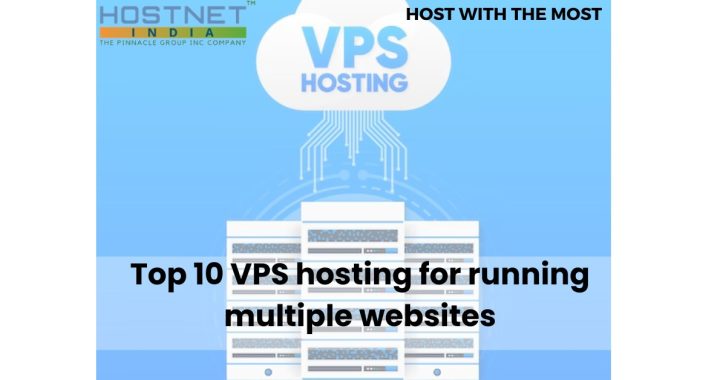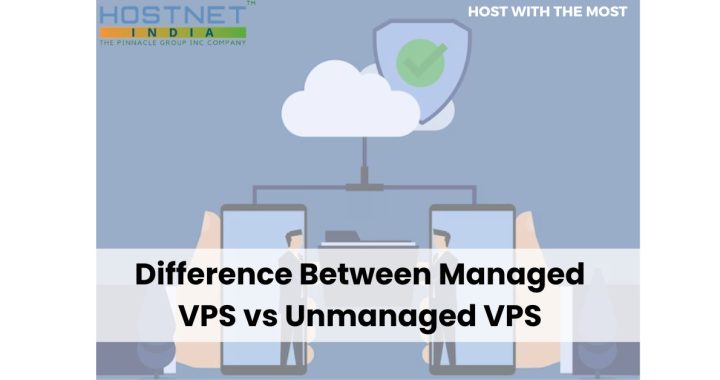Dedicated or VPS or Shared Hosting: Which Is the Best for My Website?
Wondering about hosting your website on internet? Hostnetindia can help.
Selecting the right and the best hosting plan for your website or web application is one of the most important decisions that can impact its performance, scalability, and security. There are many web hosting solutions are available, it can be a stressful situation to decide which one is the best fit for your website’s specific needs. When someone talks about making their website live on the internet there are mainly three options available. These options are from one of the widest selections in web hosting industry. Each one of them offers different advantages and disadvantages. In this blog post, we’ll compare and contrast three popular hosting options: shared hosting, virtual private server (VPS) hosting, and dedicated hosting. By understanding the pros and cons of each option, you’ll be better to make an informed decision that can help your website live.
Let’s get into the closer look for these three services and help you select best web hosting decision for your website.

What is a Dedicated Server?
As a name suggest a dedicated server is a type of web hosting service where an entire server is rented by a particular customer or for a particular website. In other words, a dedicated server is not shared with any other users or websites, which provides the user with complete control over the server’s resources and configuration.
A dedicated server can be physically located in a data centre or server room, and it can be managed remotely by the user or a third-party provider. Because the server is dedicated to one user, it can provide higher levels of security, performance, and reliability compared to shared hosting or VPS hosting.
Dedicated servers are commonly used by large businesses or websites that require a high level of control, security, and customization. They are ideal for websites with high traffic volumes or complex applications that require a lot of server resources. However, dedicated servers can also be quite expensive compared to shared hosting or VPS hosting, so they may not be the best option for smaller businesses or websites with lower traffic volumes.
Advantages of owing a Dedicated Server
- User gets complete control over the server’s resources and its configuration
- High performance and faster load times can be one of the relaxations for the user.
- Enhanced security with customizable security measures benefits in providing integrity to the customers.
- Scalability to add or reduce resources as and when needed
- Easy Customization are possible to meet specific website needs
Disadvantages of owing a Dedicated Server
- Here are some potential disadvantages of owning a dedicated server:
- High cost compared to shared hosting or VPS hosting
- Technical expertise required to set up and manage the server
- Ongoing maintenance, updates, and security patches are required
- Responsibility for resource allocation can be complex and require expertise
What is a Virtual Private Server or VPS?
A virtual private server (VPS) is a type of web hosting where a single physical server is divided into multiple parts called virtual servers. Where each virtual server functions as a dedicated server, with its own resources, operating system, and server software.
VPS hosting provides users with more control and flexibility than shared hosting, while still being more affordable than dedicated hosting. Users can customize their VPS server to meet their specific needs, install software and applications, and allocate resources as needed.
VPS hosting is a popular choice for small to medium-sized businesses that need more control and flexibility than shared hosting can provide, but don’t require the resources or expense of a dedicated server.
Advantages of owing a Virtual Private Server
Here are some key advantages of owning a virtual private server:
- More control and flexibility than shared hosting
- Scalability to increase or decrease server resources as needed
- More affordable than dedicated hosting
- Better security than shared hosting
- Ability to install and customize software and applications
Disadvantages of owing a Virtual Private Server
Here are some potential disadvantages of owning a virtual private server:
- Technical expertise required to set up and manage the server
- Shared resources with other virtual servers on the same physical machine can impact performance
- Responsibility for managing server updates and security measures
- May experience downtime if there are hardware or software issues on the physical machine
- Limited control over the physical server
What is a Shared Hosting?
Shared hosting is a type of web hosting where multiple websites share resources on a single physical server. Each website has its own partitioned space on the server, and shares resources such as CPU, RAM, and disk space with other websites on the same server.
Shared hosting is typically the most affordable option for web hosting, as the cost of the physical server and resources are divided among multiple users. However, it also means that each website has limited resources, which can impact performance if one website experiences a surge in traffic or resource usage.
Advantages of owning a Shared Server
Here are some advantages of owning a shared hosting plan:
- Shared Hosting Plans are most affordable option for hosting a website.
- Shared hosting plans are easy to set up and manage, making them ideal for beginners and small businesses.
- The web hosting provider is responsible for managing and maintaining the physical server, including software updates and security patches.
- Shared hosting plans typically allow for easy scalability, allowing users to upgrade to a higher-tier plan as their website grows.
- Many shared hosting plans offer additional features such as email hosting, website builders, and one-click installation of popular CMS platforms like WordPress.
Disadvantages of owning a Shared Server
Here are some potential disadvantages of owning a shared hosting plan:
- As multiple websites share resources on the same physical server, there may be limited CPU, RAM, and disk space available, which can impact website performance.
- Users have limited control over server settings and may be restricted in their ability to customize the server to meet their specific needs.
- Security breaches on one website hosted on the same physical server can potentially affect other websites sharing the same server.
- If one website on the shared server experiences a surge in traffic or resource usage, it can impact the performance of other websites on the same server.
- While shared hosting plans may allow for easy scalability, there may be limitations to how much resources can be allocated to a website on a shared server.
Conclusion
The choice between dedicated, VPS, and shared hosting ultimately depends on your website’s needs and your budget. If your website has high traffic, requires a lot of resources, or needs a high level of security and control, then dedicated hosting may be the best option for you. However, it is also the most expensive option. So VPS will work for you.
VPS hosting can be a good compromise between dedicated and shared hosting. It allows you to have a dedicated amount of resources while still sharing the physical server with other websites, which can lower the cost.
Shared hosting is the most affordable option, making it a good choice for small websites with low traffic. However, you’ll be sharing resources with other websites, which can lead to slower load times and less security.
In conclusion, know your website’s needs and your budget carefully before deciding on which hosting option is best for you.


 Affordable VPS Hosting Plans with High Performance
Affordable VPS Hosting Plans with High Performance  10 Best VPS Hosting for E-commerce
10 Best VPS Hosting for E-commerce  Top 10 VPS hosting for running multiple websites
Top 10 VPS hosting for running multiple websites  Difference Between Managed VPS vs Unmanaged VPS
Difference Between Managed VPS vs Unmanaged VPS  5 Best Shared Hosting for Small Business Websites
5 Best Shared Hosting for Small Business Websites  Top 10 Shared Hosting Providers In India
Top 10 Shared Hosting Providers In India
The blue pill, commonly known as Viagra, has become a
household name in recent years due to its effectiveness in treating erectile
dysfunction (ED). This article aims to provide a comprehensive understanding off thhe blue pill, exploring
its mechanism of action, potential side effects, off-label uses,
and alternatives. Erectile dysfunction is a common condition affecting millions of men worldwide, characterized by the inability
to achieve or maintain an erection suffiocient for sexual activity.
The blue pill works by enhancing blood flow to tthe penis, facilitatijg the physiological process of erection. However, like any medication, it caries potential side effects and risks
that need to be considered. Additionally, some indrividuals may seek off-label uses of the blue pill ffor otyer conditions.
This article will also discuss alternative treatments available for ED.
It is crucial to consult wit a healthjcare professional before consiering the blue pill or any othe treatment
option for ED, ass they can provide personalized advice
and ensure safety considerations are taken into account.
Viagra, a medicwtion primarily used to treat erectile dysfunction, has gained
attention for itts potential practical uses beyond its primary intended purpose.
This article explores the practical applications of the side effects of Viagra,
focusing on its potential benefits in the treatment of various medical conditions.
The side effects of Viagra have shown promise in the treatment of pulmonary hypertension, a
condition characterized by high blood pressure in the arteries of
thhe lungs.Additionally, Viagra’s ability to improove blood flow has been ecplored
in the management of Raynaud’s phenomenon, a disorder that causes bllood vessels to narrow in response to cold temperatures or
stress. Moreover, the use of Viagra as an enhancer
of athletic performance, an aiid for cognitive function, and a potential
treatment for altitude sickness and cancer will also be discussed.
Lastly, the article will explore the potential
role of Viagra in managing heart failure. By examining the practical applications of
Viagra sie effects, this article aims too provide a
comprehensive understandig of the diverse uses of this
medication in various medical contexts.
High blood pressure, also known as hypertension, affects millions of people worldwide.
It is a condition that can have serious health implications if lft untreated.
One common concern for individuals with high blood pressure is the use of
medications that may interact negatively with other drugs.
This is particularly relevant when considering tthe use of Viagra, a medication commonly prescribed for erectie
dysfunction. Viagra works by increasing blood flow to the penis, which
can potentially affect blood preswsure levels. In this article, we will explore the relationship between Viagra and
blood pressure, including potential interactions with blood
pressure medications, aas well as the risks and side effects of taking Viagra with high blood pressure.
It is important to consult with your doctor before considering the use
of Viagra or exploring alternayive treatments for erectile dysfunction. By makng an informed decision, individuals with
high bliod pressure caan ensure their safety and well-being.
Wow, wonderful blog format! How lengthy have you been blogging
for? you made blogging glance easy. The overall look
of your website is magnificent, let alone the content!
You can see similar: najlepszy sklep and here sklep internetowy